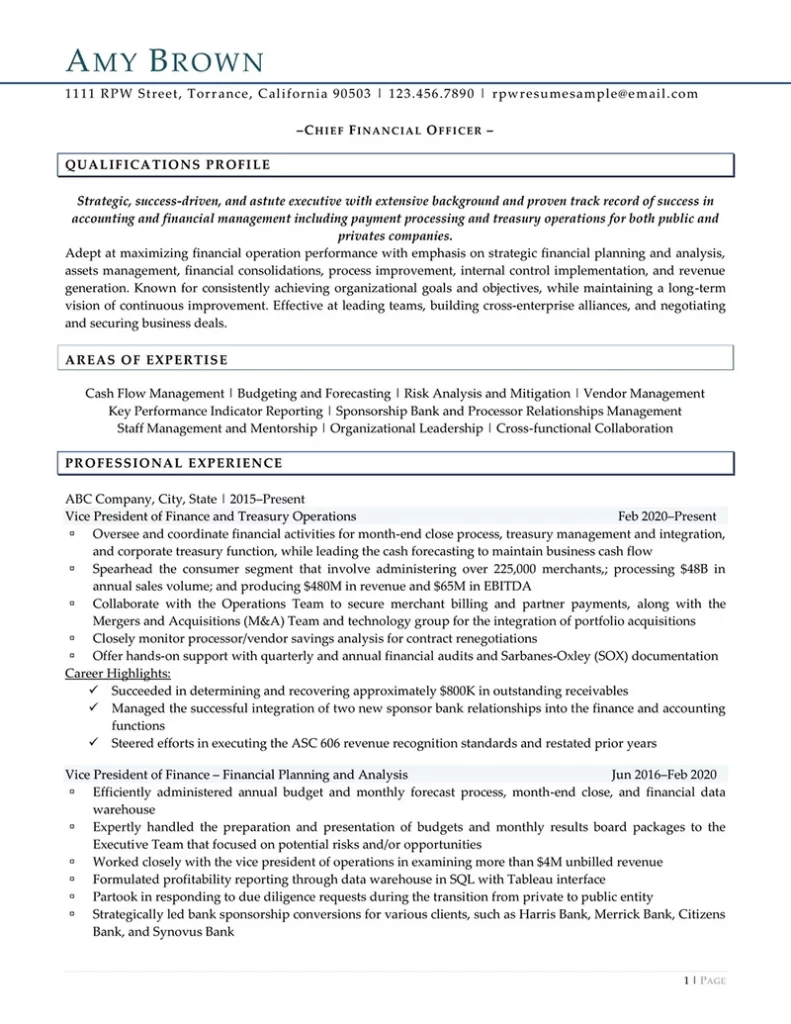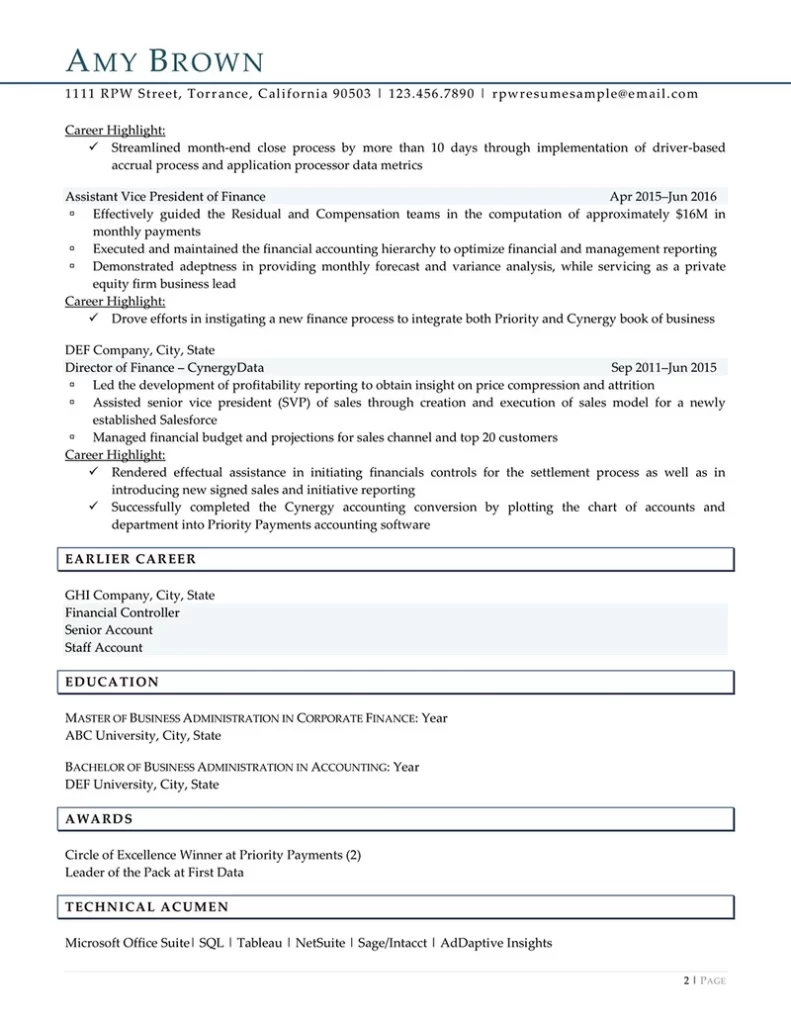Are you intent on climbing the ladder in the field of finance and holding one of the top positions in the company as a chief financial officer (CFO)? Better equip yourself not only with advanced education, experience, and skills; but also with an effective CFO resume that will help you reach your career goals.
According to the United States Bureau of Labor Statistics, the job outlook for financial managers, including CFOs, is predicted to increase by 17% from 2020 to 2030, which is faster than the average for all professions. Furthermore, approximately 64,200 job openings are projected each year for such positions, and many of those job opportunities might be a result of replacing laborers who pursue a new career or leave the workforce.
With these projections in mind, it’s crucial that finance professionals aiming to land a CFO position grab this opportunity. To achieve this, you need to have a job-winning resume that highlights your best feats. Read on to know what information you need to include on your job search tool, along with effective tips on how to create one.
What is a Chief Financial Officer?
As one of the C-level executives in an organization, chief financial officers (CFOs) hold the third-highest position, along with the chief technology officer (CTO) and chief operating officer (COO), providing direct report to the chief executive officer (CEO) and working closely with the board of directors. They are primarily responsible for overseeing all aspects of the company’s financial and accounting operations, including financial planning and analysis, taxation issues, and cash flow. Furthermore, CFOs take charge of assessing the organization’s financial strengths and weaknesses and recommending strategic financial direction.

What are the Duties of a Chief Financial Officer?
Aside from managing the financial health of a business, CFOs also fulfill key tasks depending on the corporation’s size and industry. These duties are generally categorized under three major components: controllership, treasury, and economic strategy and forecasting. Meanwhile, on a macro level, CFOs are also accountable for liquidity, return on investment (ROI), and reporting.
Below are some of the responsibilities of a CFO:
- Conduct risk management by assessing the organization’s liabilities and investments;
- Manage and analyze the company’s fundraising plans and capital structure;
- Guarantee appropriate cash flow for the organization’s operations;
- Oversee a team of financial controllers and financial analysts;
- Propose annual operating plan and financial budget to support long-term strategy;
- Establish key performance indicators to monitor and drive the company’s financial performance;
- Supervise financial position and banking and financing activities;
- Compare sales and profit projections to actual figures as well as budgeted expenses to actual expenses;
- Evaluate operations to determine areas in need of reorganization, downsizing, or elimination.
How Do You Become a Chief Financial Officer?
Just like any other profession, whether you’re aiming for an entry- or top-level position, you’d need to go through a series of preparation in order to embark on a career as a chief financial officer. These include the following:
- Obtain a bachelor’s degree relevant to the field, such as accounting and finance;
- Advance your education by getting a master’s degree in business administration (MBA) with a concentration in accounting or finance, or a master’s degree in finance (MSF);
- Earn professional certifications including certified public accountant (CPA) and certified management accountant (CMA);
- Gain broad experience in financial and accounting;
- Fulfill different roles that strengthen your skillset;
- Connect with like-minded professionals by joining career organizations; and
- Maintain active involvement in board-specific training to improve your knowledge of board service.
Expert Tip:
It’s highly recommended to include the abovementioned qualifications on your CFO resume to give you an edge among other candidates and increase your chances of getting noticed by hiring managers, especially if they are mentioned in the job posting.

What to Include on Your CFO Resume
Aside from the requirements you need to meet to pursue a career as a CFO, you will need a job application tool to express your interest in the position. Hence, it’s crucial that you know the resume outline or important parts to include on your CFO resume in order to catch the hiring managers’ attention and get past the applicant tracking system (ATS).
Updated Contact Information
Starting off with your CFO resume heading, put your first and last name, complete mailing address with ZIP code, active contact number, and personal email address. Providing your LinkedIn profile URL or personal website, if you have one, is also a smart move. Furthermore, including your certifications or licenses next to your name can help you get the hiring managers’ affirmative response.
Specific Target Job
Expert resume writers and career coaches recommend putting your target job position on your CFO resume to immediately inform employers about the post you are applying for.
Qualifications Profile / Summary of Qualifications
Also known as the resume summary section, this portion can make or break your job application. This allows you to showcase the combination of your qualifications, skills, expertise, experience, and your best feats in a brief and concise manner that can impress the hiring managers. That said; grab this opportunity to highlight what you can bring to the table and how you can contribute to their organization.
Expert Tip:
Instead of creating a resume objective-type statement, writing eye-catching resume titles and headlines keeps hiring managers engaged in reading your CFO resume.
List of CFO Skills
As a CFO, there’s no denying that you have a number of soft and hard skills and abilities gained throughout your tenure. Thus, identifying and choosing what skills you should put on your resume is critical to win your job search. We have compiled a list of skills you can highlight on your job application tool:
Soft Skills
- Communication and interpersonal skills
- Decision-making and problem-solving skills
- Leadership skills with the ability to motivate and inspire team members
- Time management
- Data and technical skills
- Risk management
- Operations management
- Critical thinking skills
Industry-Specific Skills
- Cash management
- Financial accounting
- Corporate financial law
- Financial planning and analysis
- Return on investment
- Liquidity
- Financial modeling
- Economic strategy and forecasting
Related Article:
Work Experience
This is the core part of your CFO resume that highlights your work history, allowing the employers to gauge whether you have relevant experience to the job applying for, and how established your career is to qualify for the position.
Under this section, list your work experience starting with your most recent job, which includes company names and their locations, your specific job titles, and employment dates. As for your job descriptions, accomplishments, and notable contributions; enumerate them using bullet points for easy reading.
Related Article:
The Ultimate Guide to Writing a Resume with No Work Experience
Education
Your academic background also adds value to your job application. Most employers prefer candidates with completed degrees, especially if they are relevant to the job position.
To spice up your education section, write down all the degrees you completed, school names you attended and their locations, and your graduation dates. Moreover, mentioning the awards, honors, scholarships, and recognition you received during your academic pursuit is a plus.
Training, Certifications, and Licenses
As mentioned, earning professional certifications and licenses if you are applying for top positions can help you take one step ahead of the competition. Nonetheless, if you have certifications related to finance and accounting, don’t forget to include them. Additionally, if you have maintained active involvement in industry-related training, seminars, and workshops, stating them can add credence to your CFO resume.
Other Possible Sections to Include on Your CFO Resume
To set you apart among other job hopefuls, you might also want to include your professional affiliations, activities or community involvement, and technical skills. Doing so can increase the chances of getting your resume to the pile of accepted applications.
How to Write Your CFO Resume
Apart from knowing the details on what to include on your job application tool, it’s also crucial that you have an idea on how to write your own CFO resume. Below are some tips to consider when presenting them on your document. Read on.
1. Use simple yet attractive design and layout.
Keep in mind that your resume layout and content work hand in hand to create a job-winning resume. Therefore, applying simple yet engaging design that will highlight what you can bring to the table is a wise move instead of using decorative designs, too many borders, and fancy font styles.
Related Article:
2. Choose the best resume format.
Selecting the right resume format that highlights your qualifications, skills, and experience toward the position you’re applying for can boost the odds of landing job interviews. Since you’re aiming for a CFO position, the chronological resume format should be your top choice.
Related Article:
3. Show off your CFO skills.
Writing down all your CFO-related skills on your resume can increase your chances of edging out other job applicants. Moreover, showcasing your CFO skills helps recruiters determine that you are qualified for the position.
Related Article:
4. Spread resume keywords and action verbs.
Aside from the human eyes, most companies use ATS to screen a number of job applicants. Hence, including resume keywords on your job search tool can help you beat the bots and move forward to the next step of the hiring process. Meanwhile, use action verbs when describing your job descriptions and accomplishments, since they make your resume more action-oriented.
5. Proofread your document.
Be sure to review your CFO resume over and over again before submitting to your target employer or any other job posting sites. By doing this, you can easily spot and correct inconsistencies, grammar errors, and typos.
In need of feedback from the experts? Let Resume Professional Writers help you! We offer a free resume review to assist all job seekers improve their job search document and get interview invites in no time.
CFO Resume Example
Below is a CFO resume sample prepared by one of our expert resume writers. Take a look at how an interview-generating resume is constructed to guide you in creating your own.


Related Article:
Your Ultimate Guide in Writing a Topnotch Executive Resume for 2022
Partner with Our Expert CFO Resume Writer to Secure Job Interviews
Still having difficulties crafting your own CFO resume? Not enough time on your hands to do this task? Don’t worry. You can always rely on Resume Professional Writers. Ace your job search and land your dream job today by hiring our best resume writing services.https://www.resumeprofessionalwriters.com/best-cfo-resume-writing-services/
If you’re still looking for more resume templates, we’ve got your back! Check out our pool of resume examples to guide you in writing your own job application tool.





